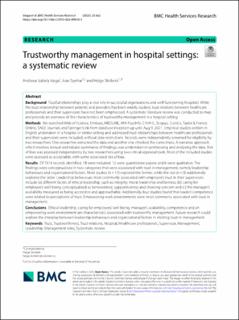| dc.description.abstract | Background Trustful relationships play a vital role in successful organisations and well-functioning hospitals. While the trust relationship between patients and providers has been widely studied, trust relations between healthcare professionals and their supervisors have not been emphasised. A systematic literature review was conducted to map and provide an overview of the characteristics of trustworthy management in a hospital setting.
Methods We searched Web of Science, Embase, MEDLINE, APA PsycInfo, CINAHL, Scopus, EconLit, Taylor & Francis Online, SAGE Journals and Springer Link from database inception up until Aug 9, 2021. Empirical studies written in English undertaken in a hospital or similar setting and addressed trust relationships between healthcare professionals and their supervisors were included, without date restrictions. Records were independently screened for eligibility by two researchers. One researcher extracted the data and another one checked the correctness. A narrative approach, which involves textual and tabular summaries of findings, was undertaken in synthesising and analysing the data. Risk of bias was assessed independently by two researchers using two critical appraisal tools. Most of the included studies were assessed as acceptable, with some associated risk of bias.
Results Of 7414 records identified, 18 were included. 12 were quantitative papers and 6 were qualitative. The findings were conceptualised in two categories that were associated with trust in management, namely leadership behaviours and organisational factors. Most studies (n = 15) explored the former, while the rest (n = 3) additionally explored the latter. Leadership behaviours most commonly associated with employee’s trust in their supervisors include (a) different facets of ethical leadership, such as integrity, moral leadership and fairness; (b) caring for employee’s well-being conceptualised as benevolence, supportiveness and showing concern and (c) the manager’s availability measured as being accessible and approachable. Additionally, four studies found that leaders’ competence were related to perceptions of trust. Empowering work environments were most commonly associated with trust in management.
Conclusions Ethical leadership, caring for employees’ well-being, manager’s availability, competence and an empowering work environment are characteristics associated with trustworthy management. Future research could explore the interplay between leadership behaviours and organisational factors in eliciting trust in management. | en_US |

